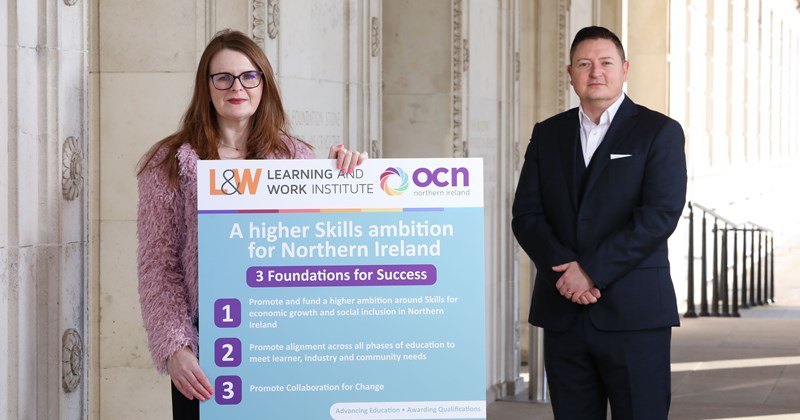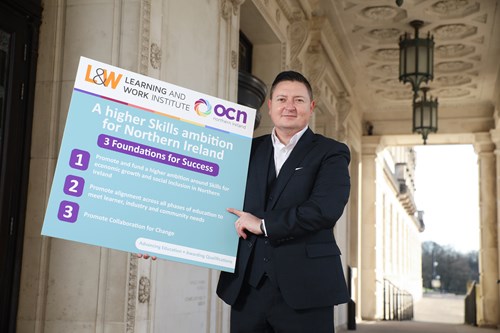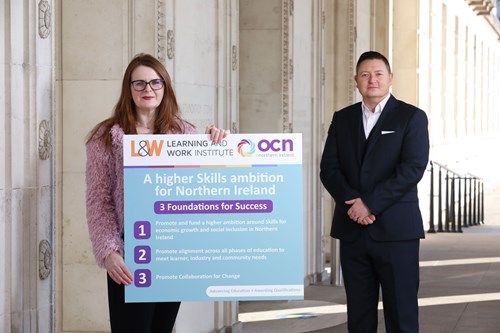
A Higher Skills Ambition for Northern Ireland: Skills for Growth and Social Inclusion
27/01/2021
Northern Ireland risks slipping further behind other countries in the skills of its workforce, a new report by a leading research institute finds.

Martin Flynn, Chief Executive, Open College Network NI
The report, from Learning and Work Institute, looks at how the skills of Northern Ireland’s workforce are likely to compare to other countries by 2030. It finds that in 2030 Northern Ireland will have a substantially higher proportion of people qualified below the equivalent of GCSE level than the OECD average (17.4% compared to 12.8%) and a lower proportion with at least a degree-level qualification (44.9% compared to 47.8%).
According to the new report, commissioned by Open College Network NI (OCN NI), by 2030 Northern Ireland will have the fourth highest proportion of low qualified people out of 16 OECD comparators. Moreover, it will be ranked as low as 14th for the proportion of people who are highly qualified. In comparison, the Republic of Ireland would be joint first for the proportion of people with high qualifications and have the joint lowest proportion with low qualifications. Northern Ireland’s skills profile in 2030 will struggle to match the UK’s position today, despite a further ten years to improve skills.
The report calls for the Northern Ireland Executive to set a new higher ambition for skills, backed by investment. It argues for increased investment in learning and skills, making learning a key part of other public services like health, and taking a more joined-up approach with government, employers and individuals working together. The coronavirus crisis has sharpened the need for investment in skills to tackle the big rise in unemployment and help people retrain for new jobs. There should be regular independent reports to keep track of progress and compare this to other countries.
Martin Flynn, OCN NI Chief Executive commented: “This report provides us with a glimpse into what the future may be like, in terms of NI’s skills profile. While the report shows that Northern Ireland’s skills are likely to improve over the next 10 years, we will still remain behind other countries. The report provides the Northern Ireland Executive with an opportunity to set a higher skills ambition in Northern Ireland, which in turn will contribute to improved economic growth, social justice and community cohesion.”
Diane Dodds MLA, Minister for the Economy, said: “Driving forward the skills agenda and providing opportunities for people to learn and upskill has never been more important and remains a key priority for my Department and the Executive. In a rapidly evolving global economy, it is imperative that we use skills to position Northern Ireland and its skilled workforce prominently in the global market. Taking forward this Agenda will be central to my new Skills Strategy.”
Peter Weir MLA, Minister Department of Education said: “I am committed to ensuring that our education system enables our young people to develop the knowledge and skills required to respond to the rapid change that is taking place in the labour market, driven by technological advance and global economic activity. It is crucial that they have the tools to allow them to fulfil their potential. Our curriculum, with a focus on personal capabilities and skills, will help to ensure that our young people are equipped to meet the changing demands of business and the economy.”
Stephen Evans, Chief Executive of Learning and Work Institute, said: “The importance of learning and skills have been heightened by the coronavirus pandemic. Many more people will need help to find work or to retrain. Our report shows that Northern Ireland’s skills are likely to improve, but still lag behind other countries. If we want a prosperous, fair and inclusive Northern Ireland, we need to invest in a higher ambition for learning and skills.”

Dr Caoimhe Archibald MLA, Chair, Committee for the Economy with
Martin Flynn, Chief Executive, Open College Network NI
ENDS
Notes for editors
- Media Enquires: OCN NI, Lawrence Duffy (DRC) lawrence@duffyrafferty.com
L&WI, Mintra Sadler mintra.sadler@learningandwork.org.uk
- Learning and Work Institute is an independent policy, research and development organisation dedicated to lifelong learning, full employment and inclusion. We research what works, influence policy, develop new ways of thinking, and help implement new approaches.
- The Open College Network Northern Ireland (OCN NI) is a leading Awarding Body, working with Further Education Colleges, Schools, Training Organisations, Third Sector Organisations, Health Trusts, Prisons and other education and training organisations. Our offices are based in Belfast and we are regulated by statutory bodies to develop professional and technical (vocational) qualifications from Entry Level up to and including Level 5 across all subject areas. Its mission is to ‘develop and award qualifications which engage, enrich and equip learners for life.’
OCN NI is an independent, self-financing charitable organisation that has a proven track record of delivering and contributing to the NI skills agenda. As an indigenous Awarding Body based in Belfast, its priority is to develop and maintain qualifications tailored to the needs of people living and working in NI. Its flexibility and responsiveness to economic need ensures its qualifications are tailored to the needs of education and training providers, employers, learners and align to the outcomes of the NI Programme for Government.
Through working in partnership with its recognised education and training providers, it is able to develop and award qualifications which help tackle educational underachievement and remove barriers to learning. To date the educational charity has registered over 500,000 learners and has worked with over 400 organisations in the public, private and not for profit sectors
